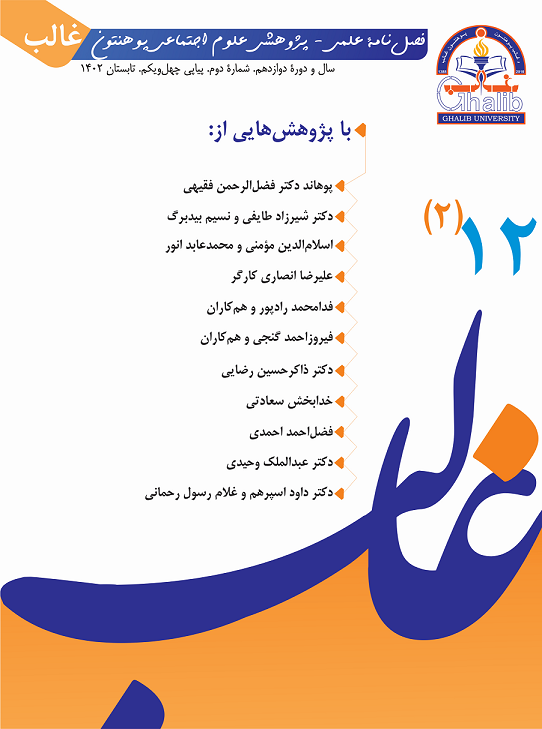Explaining the Proposition the of international Relations in the Paradigm of Postmodernism
DOI:
https://doi.org/10.58342/ghalibqj.V.12.I2.4Keywords:
Traditional Approach, Modernism, Postmodernism, Statement, Paradigm, International RelationsAbstract
In the current era, all human knowledge may be revised in some way by paradigms that claim to know better. The discipline of international relations, as one of the branches of political science, has opened a special place for postmodernism thinkers, considering the importance of the subject, the main goal of this Article is based on how the paradigm of postmodernism reached the statements of international relations in particular. It analyzes and criticizes the traditional discourses that are considered the dominant and holistic discourse. This research is looking for an answer to the question of whether it is possible to accept postmodernism in the framework of international relations theories as an analytical paradigm, in such a way that the statements of the science of international relations are resolved through it. With the premise that postmodernism as a meta-affirmative approach is a relatively new subject in the science of international relations. In this research, a descriptive-analytical method has been used, using books, scientific articles, and authoritative research journals. The area of issue including international relation elements science. The results of the research show that the paradigm of postmodernism does not agree with any kind of generalization, truth-believing, and structure of statements of international relations, and they consider them as a tool in the hand of power. Understanding and recognizing the components of the postmodernism paradigm may change our attitude in this field, and by thinking critically about what is said as the facts of the subject of international relations, ideas that have never been said or written will be exposed.
References
اشقلی عباسی، مجید. (1389). «از مدرنیسم تا پست مدرنیسم در روابط بینالملل». ایران: مجلۀ علمی – تخصصی سیاسی و اقتصادی. ش 266. صص 266 – 265. <http://ensani.ir/fa/article/89614/%D8%A7%D8%B2-%D9%85%D8%AF%D8%B1%D9%86%DB%8C%D8%B3%D9%85-%D8%AA%D8%A7-%D9%BE%D8%B3%D8%AA-%D9%85%D8%AF%D8%B1%D9%86%DB%8C%D8%B3%D9%85-%D8%AF%D8%B1-%D8%B1%D9%88%D8%A7%D8%A8%D8%B7-%D8%A8%DB%8C%D9%86-%D8%A7%D9%84%D9%85%D9%84%D9%84 >.
بیات، عبدالرسول و همکاران. (1387). فرهنگ واژهها. چدوم. قم: مؤسسۀ اندیشه و فرهنگ دینی.
جکسون، رابرت؛ سورنسون، گئورک. (1390). درآمدی بر روابط بینالملل. ترجمۀ مهدی ذاکریان، احمد تقیزاده و حسن سعیدکلاهی. چسوم. تهران: نشر میزان.
دیوتاک، ریچارد. (1388). «پستمدرنیزم در روابط بینالملل». ترجمۀ علیرضا ازغندی و محسن محمودی. ایران: فصلنامۀ تحقیقات حقوق خصوصی و کیفری. 5(1). 13-44. <https://jlap.srbiau.ac.ir/article_7216.html>.
رشیدی، محمد مهدی. (1388). «پارادایم یا الگوی تفکر». ایران: فصلنامۀ علمی – تخصصی شاخص کارآفرینی.
شولت، یان آرت. (1386). نگاهی موشکافانه بر پدیدۀ جهانیشدن. ترجمۀ مسعود کرباسیان. چدوم. تهران: شرکت انتشارات علمی و فرهنگی.
قاسمی، فرهاد. (1389). اصول روابط بینالملل. تهران: نشر میزان.
قوام، عبدالعلی. (1391). اصول سیاست خارجی و سیاست بینالملل. چ هجدهمم. تهران: سازمان مطالعه و تدوین کتب علوم انسانی دانشگاهها (سمت)، مرکز تحقیق و توسعة علوم انسانی.
قرهباغی، علیاصغر. (1380). تبارشناسی پستمدرنیزم. تهران: دفتر پژوهشهای فرهنگی.
کهون، لارنس. (1394). از مدرنیسم تا پستمدرنیزم. ترجمۀ عبدالکریم رشیدیان. تهران: نشر نی.
کلوسکو، جورج. (1392). تاریخ فلسفۀ سیاسی. ج اول. چ سوم. ترجمۀ خشایار دیهیمی. تهران: نشر نی.
مقدم حیدری، غلامحسین؛ آیتاللهی، حمیدرضا. (1390). «عقلانیت به مثابه حفظ گزارههای ثابت و جایگزینی گزارههای سیال». ایران: نشریۀ فلسفۀ علم. پژوهشگاه علوم انسانی و مطالعات فرهنگی. سال اول. پیاپی اول. شمارۀ دوم. صص 143 – 161.
منوچهری، عباس و همکاران. (1393). رهیافت و روش در علوم سیاسی. چ ششم. تهران: سازمان مطالعه و تدوین کتب علوم انسانی دانشگاهها (سمت)، مرکز تحقیق و توسعه علوم انسانی.
References
Ashqali_e_Abbasi, Majid. (2010). "From modernism to postmodernism in international relations". Iran: Political and economic scientific Journal. No. 266. pp. 266-265.<%8C%D8%B3%D9%85-%D8%AA%D8%A7-%D9%BE%D8%B3%D8%AA-%D9%85%D8%AF%D8%B1%D9%86% DB%8C%D8%B3%D9%85-%D8%AF%D8%B1-%D8%B1%D9%88%D8%A7%D8%A8%D8%B7-%D8%A8%DB%8C%D9%86-%D8%A7%D9%84%D9%85%D9%84%D9%84>.
Bayat, Abdulrsool and et.al. (2008). “dictionary of words”. Second printing, Qom: Institute of Religious Thought and Culture. (Persian)
Devetak, Richard.(2009). “Post – Modernism in International Relations”. Translation by: Alireza Azqandi and Mohsan Mahmodi, Iran: Danish Nama Politic and Law, spring and summer 2009, pp:13 – 44.
Gharebaghi, Ali Asghar. (2001). “Genealogy of Postmodernism”. First printing, Tehran: cultural studies. (Persian)
Ghavam, Abdol – Ali. (2012). “principle of foreign policy and international politics”, the sixteenth printing, Tehran: SAMT. (Persian)
Hawon, Lawernce. (2015). “from modernism to postmodernism”. Translated by: Addulkarim Rashidian, Tehran: Nashr-e Ney.
Jackson, Robert and George Sorenson. (2011). “Introduction to International Relations”. Translation by: M Zakerian, A. Taghizadeh and H. S.Kolahi, Tehran: Mizan Legal Foundation.
Klosko, George. (2013). “History of Political Theory”. Translated by: Khashayar Dayhami, third printing, Tehran: Nashr-e Ney.
Manoochehri, Abbs and other colleagues. (2014). “Approach and Method in Political Science”. Sixth printing, Tehran: SAMT. (Persian)
Moghadam Heydari, Gholam Hossein; Ayatollahi, Hamidreza. (2011). "Rationality as maintaining fixed propositions and replacing fluid propositions". Iran: Philosophy of Science. Research Institute of Humanities and Cultural Studies. first year. first Volume. Second Issue. pp. 143-161.
Qasami ,Farhad. (2010). “ Principle of Internationa Relationships”, Tehran: Nashra Mizan. (Persian)
Rashidi, Mohammad Mehdi. (2009). "Paradigm or pattern of thinking". Iran: Scientific Quarterly Journal of Entrepreneurship.
Scholte, Jan Aart. (2007). “A close look at the phenomenon of globalization”. Translated by: Massoud Karbasian, second printing, Tehran: Elmi Farhangi Publishing C.
Downloads
Published
How to Cite
Issue
Section
License
Copyright (c) 2023 Ghalib Journal

This work is licensed under a Creative Commons Attribution 4.0 International License.













